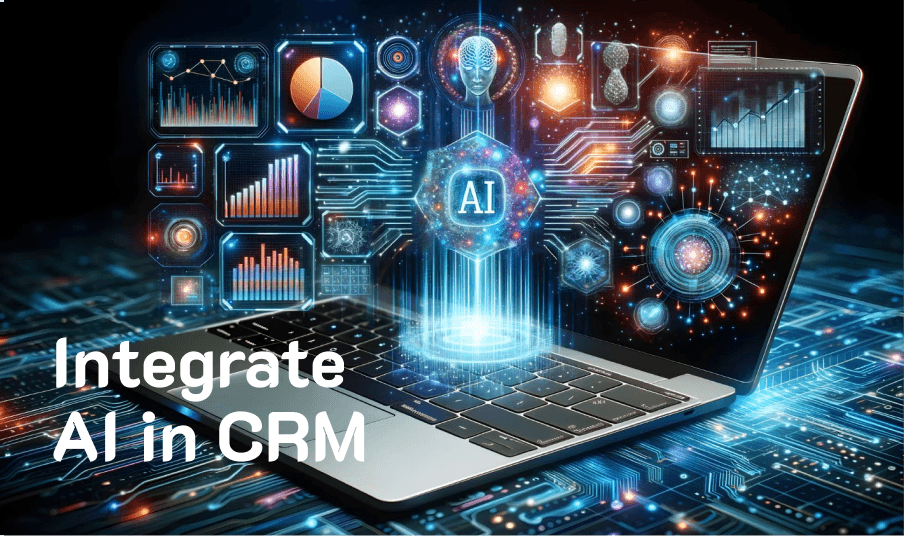In an era defined by dynamic customer expectations and evolving market landscapes, businesses are increasingly recognizing the transformative power of Artificial Intelligence (AI) in Customer Relationship Management (CRM) portals.
The integration of AI in CRM systems is not merely a technological upgrade; it represents a strategic imperative for businesses seeking to elevate customer experiences, optimize operational processes, and gain a competitive edge.
This article delves into the pivotal role AI plays in reshaping CRM portal dynamics, exploring how businesses stand to benefit from harnessing the capabilities of AI to unlock unparalleled insights, streamline workflows, and foster more meaningful connections with their clientele.
Join us on a journey through the compelling reasons why businesses today cannot afford to overlook the transformative potential when they integrate AI into their CRM portals.
Understanding AI in CRM
In the ever-evolving landscape of CRM development services, AI emerges as a powerful catalyst reshaping the way businesses connect with their clientele.
At its core, AI in CRM represents a fusion of cutting-edge technologies that goes beyond mere automation, elevating the entire customer experience to unprecedented heights.
This exploration aims to demystify the essence of AI in CRM, delving into its definition and elucidating the pivotal role it plays in modern business strategies.
At its essence, AI in CRM signifies a paradigm shift from traditional approaches, ushering in a new era where machines seamlessly collaborate with human insights. This symbiotic relationship aims to enhance not only operational efficiency but also the fundamental understanding of customer behaviors and preferences.
The transformative potential of AI in CRM is intricately tied to its sophisticated technologies, notably machine learning and natural language processing.
These advancements empower CRM systems to evolve from static data repositories to dynamic, proactive platforms capable of learning, adapting, and comprehending the nuances of customer interactions.
Machine learning algorithms decipher intricate patterns in data, fostering predictive analytics that anticipate customer needs and optimize business strategies.
Concurrently, natural language processing enables custom CRM solutions to comprehend and respond to human language, facilitating more seamless and personalized customer interactions.
Enhancing Customer Insights
In the dynamic realm of CRM software development, the integration of Artificial Intelligence emerges as a game-changer, offering businesses unparalleled capabilities to delve into the intricacies of customer behavior and preferences. This exploration delves into the transformative impact of AI on customer insights within CRM portals, unveiling the potential for businesses to forge deeper connections, drive personalized experiences, and craft finely-tuned marketing strategies.
AI Unleashing Deeper Customer Insights:
By harnessing AI within CRM portals, businesses gain the ability to delve beyond surface-level data, unraveling the intricate tapestry of customer behavior. Machine learning algorithms analyze vast datasets, identifying patterns, trends, and correlations that might escape traditional analytical approaches. This depth of insight enables businesses to comprehend not just what customers do but also why they do it, laying the foundation for a more profound understanding of their audience.
Crafting Personalized Experiences:
The integration of AI in CRM portals acts as a catalyst for personalization, allowing businesses to tailor interactions with customers on an individual level. AI algorithms, fueled by comprehensive customer insights, facilitate the delivery of personalized recommendations, content, and services. From curated product suggestions to customized communication strategies, businesses can enhance customer experiences by aligning offerings precisely with individual preferences and needs.
Precision in Targeted Marketing Strategies:
AI-infused CRM portals empower businesses to transcend generic marketing approaches and embrace precision. By understanding customer preferences, purchasing patterns, and engagement history, AI facilitates the creation of targeted marketing campaigns. This strategic alignment ensures that marketing efforts resonate with the right audience at the right time, fostering engagement and maximizing the impact of promotional initiatives.
Optimizing Sales Processes
The infusion of AI into Customer Relationship Management systems stands as a beacon of transformative potential. It delves into the realm of optimizing sales processes, showcasing how AI seamlessly integrates into custom CRM solutions, offering features that not only streamline but elevate the entire sales journey.
Streamlining Sales with AI Precision:
AI becomes the silent architect behind streamlined sales processes within CRM systems. By automating repetitive tasks, AI liberates sales teams from mundane operations, allowing them to focus on strategic initiatives and meaningful interactions with clients. From contact management to deal tracking, AI's role in custom CRM software development is akin to a dynamic assistant, enhancing operational efficiency and ensuring no opportunity slips through the cracks.
Predictive Analytics for Lead Scoring:
One of the standout features that AI brings to the forefront is predictive analytics for lead scoring in CRM Portal. Machine learning algorithms analyze historical data, identifying patterns that correlate with successful conversions. This insight empowers sales teams to prioritize leads based on their likelihood to convert, ensuring that time and resources are allocated where they yield the maximum impact. The result is a finely-tuned lead scoring system that optimizes the entire sales funnel.
Intelligent Sales Forecasting:
AI extends its prowess to the realm of sales forecasting, transforming it from a speculative exercise to a data-driven science. By analyzing historical data, market trends, and various external factors, AI-driven custom CRM solutions provide intelligent sales forecasts. This foresight empowers businesses to make informed decisions, anticipate market shifts, and proactively align resources with projected sales trajectories.

Improving Customer Service
CRM portals, where the quality of service defines customer satisfaction, Artificial Intelligence emerges as a formidable ally in elevating customer support to unprecedented levels. This exploration focuses on the pivotal role of AI-powered chatbots and virtual assistants, unraveling how these intelligent solutions reshape and enhance customer service within CRM portals.
AI-Powered Chatbots: The Responsive Concierge:
AI-driven chatbots stand at the forefront of transforming customer service dynamics. These virtual assistants, armed with natural language processing capabilities, engage with customers in real-time, offering instant responses to queries, troubleshooting issues, and providing relevant information. The result is a responsive concierge service that operates 24/7, ensuring customers receive immediate assistance and information, irrespective of the time or day.
Virtual Assistants: Personalized Support Round the Clock:
Beyond chatbots, AI extends its influence through virtual assistants, delivering personalized support that transcends conventional service expectations. Virtual assistants leverage machine learning to understand customer preferences, past interactions, and individual needs. This depth of understanding allows businesses to offer tailored recommendations, troubleshoot complex issues, and create a seamless support experience that mirrors the efficiency of human interaction.
Examples of AI-Driven Support Excellence:
Numerous businesses have embraced AI-driven solutions to enhance customer support within CRM portals. From e-commerce platforms utilizing chatbots for order tracking and product recommendations to service industries deploying virtual assistants for reservation management and issue resolution, these examples underscore the versatility of AI in optimizing customer service across diverse sectors.
Increasing Operational Efficiency
In the dynamic landscape of Customer Relationship Management, the integration of Artificial Intelligence emerges as a cornerstone for unlocking unparalleled operational efficiency. This exploration delves into the transformative power of AI in automating routine tasks within mobile CRM solutions, offering businesses a pathway to streamline operations, reduce manual efforts, and achieve unprecedented levels of efficiency.
AI Automation: Redefining Routine Tasks:
The integration of AI in CRM systems marks a paradigm shift, liberating businesses from the shackles of routine tasks. AI excels in automating repetitive operations, from data entry and organization to scheduling and follow-ups. This not only reduces the burden on human resources but also minimizes the risk of errors associated with manual processes. The result is a CRM ecosystem where routine tasks are seamlessly executed with precision and speed.
Efficiency Gains through AI Integration:
Real-world examples abound, showcasing businesses that have harnessed AI to achieve remarkable efficiency gains within CRM operations. From automating lead qualification processes to streamlining customer communications, AI-driven custom CRM solutions optimize workflows, allowing teams to focus on strategic initiatives. These efficiency gains translate into resource optimization, faster decision-making, and an overall agile approach to manage customer data & interactions.
Streamlined Operations in Action:
Consider an ecommerce platform utilizing AI to automate order processing, ensuring swift and error-free transactions. Another example could be a service industry employing AI for appointment scheduling and resource allocation, eliminating bottlenecks and enhancing overall operational agility. These instances illustrate how AI becomes the silent force behind streamlined CRM operations and make it easier to manage customer data, driving efficiency across diverse business scenarios.
Data-driven Decision Making
AI stands as a formidable catalyst for ushering in a new era of data-driven decision-making. This exploration delves into the profound impact of AI in providing actionable insights within custom CRM solutions, showcasing how businesses can harness this transformative power to make informed and strategic decisions based on CRM data.
AI's Role in Actionable Insights:
AI within CRM software development becomes the linchpin for unlocking actionable insights from vast datasets. Machine learning algorithms analyze customer interactions, transaction history, and market trends, distilling complex information into comprehensible patterns. This transformation of raw data into actionable insights empowers businesses to navigate the intricacies of customer behavior, market dynamics, and internal processes with unprecedented clarity.
Leveraging AI for Informed Decisions:
When the businesses integrate AI it enables them to move beyond intuitive decision-making and embrace a data-driven paradigm. AI algorithms, fueled by real-time CRM data, forecast trends, identify opportunities, and highlight potential challenges. This wealth of information becomes the foundation upon which businesses can base their decisions, ensuring that each choice is not just informed but optimized for maximum impact.
Realizing Informed Decision-Making:
Real-world examples abound, demonstrating how businesses leverage AI to achieve data-driven decision-making excellence within custom CRM solution. From identifying high-value leads to predicting customer churn and optimizing marketing strategies, AI-driven CRM systems empower decision-makers with the insights needed to steer the organization in the right direction.

Scalability and Adaptability
There are a lot of transformative benefits of AI integration within CRM portals, showcasing how businesses can not only scale their operations seamlessly but also future-proof their CRM systems to adapt to the dynamic demands of the market.
Scalability through AI Integration:
AI becomes the cornerstone for scaling CRM operations with unprecedented ease. As businesses grow, AI-driven mobile CRM solutions effortlessly handle increased data volume, customer interactions, and operational complexities. The scalability benefits extend to adapting to seasonal fluctuations, sudden surges in demand, and evolving market dynamics. AI ensures that CRM portals can expand and contract organically, aligning with the ever-changing needs of the business.
Adaptability for Dynamic Markets:
The dynamic nature of markets demands CRM portals that can adapt swiftly to emerging trends, technological shifts, and changing customer expectations. AI integration provides the adaptability needed to navigate these challenges. Machine learning algorithms within CRM portals learn and evolve with each interaction, ensuring that the system remains agile and responsive. This adaptability extends to accommodating new features, integrating with emerging technologies, and seamlessly aligning with evolving business strategies.
Future-Proofing with AI Technologies:
The infusion of AI in CRM systems is akin to future-proofing these critical business assets. AI technologies, such as machine learning and predictive analytics, equip CRM portals to anticipate market shifts, customer preferences, and industry trends. Businesses that embrace AI-driven CRM not only scale effortlessly but also position themselves at the forefront of technological advancements, ensuring sustained relevance and competitiveness in an ever-evolving landscape.
Challenges and Considerations
When businesses integrate AI into Customer Relationship Management systems bring forth transformative potential, but not without its set of challenges and considerations. This exploration delves into the hurdles that organizations may encounter during integration of AI in CRM and provides strategic insights on overcoming obstacles, ensuring a successful implementation that maximizes the benefits of AI within custom CRM solutions.
Ensuring Data Quality and Accuracy:
A fundamental challenge revolves around maintaining data quality and accuracy, crucial for optimal AI performance. Businesses must invest in robust data cleansing processes, ensuring that AI algorithms operate with clean, reliable information. Regular audits and updates become essential to guarantee that AI decisions are based on accurate and up-to-date data.
Addressing User Adoption and Training:
The introduction of AI may face resistance from users unfamiliar with the technology. User adoption and training are critical considerations. Businesses should prioritize comprehensive training programs, making AI functionalities accessible and showcasing how they enhance daily workflows. Fostering a culture of continuous learning ensures that the workforce embraces AI as a valuable tool.
Managing Integration with Existing Systems:
Seamlessly integrating AI with current CRM portals presents a notable consideration. Compatibility issues may arise, necessitating an assessment of AI solutions' interoperability with the existing infrastructure. A phased integration approach, thorough testing, and collaboration with AI vendors or developers can help mitigate potential challenges.
Navigating Ethical and Regulatory Concerns:
AI applications may encounter ethical concerns and regulatory compliance issues. Establishing clear guidelines on data privacy, transparency, and ethical AI use is crucial. Collaboration with legal experts ensures that AI implementations align with industry regulations, fostering trust with customers and stakeholders.
Continuous Monitoring and Improvement Strategies:
AI systems are dynamic and require ongoing monitoring and improvement. Businesses should establish mechanisms for continuous evaluation of AI performance, identifying areas for enhancement and addressing evolving business needs. Regular updates and refinements to AI algorithms ensure that the system remains aligned with organizational goals.
Case Studies and Success Stories
In this section, we'd like to explore real-life triumphs where businesses have harnessed the transformative power of AI in their CRM portals. These case studies and success stories provide tangible examples of how AI integration has reshaped customer interactions, elevated sales processes, and propelled overall business performance.
Amazon's Personalized Recommendations:
Outcome: Amazon, the e-commerce giant, utilizes AI algorithms in its CRM system to analyze user behavior and preferences. This approach powers the platform's personalized recommendation engine, resulting in a significant increase in customer engagement, higher conversion rates, and a substantial boost in sales. The seamless integration of AI has redefined how Amazon tailors its offerings to individual users, enhancing the overall shopping experience.
Salesforce's AI-Powered Einstein Analytics:
Outcome: Salesforce, a pioneer in custom CRM solutions, integrated AI through its Einstein Analytics platform. This AI-driven tool provides predictive insights, helping sales teams make informed decisions. Real-time data analysis, trend predictions, and lead scoring have contributed to a more efficient sales process. Salesforce's success story exemplifies how AI can optimize sales strategies and elevate CRM functionality.
Spotify's Dynamic Playlist Recommendations:
Outcome: Spotify, a global music streaming service, leverages AI in CRM to curate dynamic playlists based on user preferences and listening habits. The integration has led to a substantial increase in user engagement, longer session durations, and improved customer satisfaction. Spotify's case highlights how AI can enhance customer insights and deliver personalized content, fostering a deeper connection with users.
Bank of America's AI-Powered Chatbot Erica:
Outcome: Bank of America introduced Erica, an AI-powered virtual assistant integrated into its CRM portal. Erica assists customers with various banking tasks, answers queries, and provides financial insights. This innovative use of AI has streamlined customer service, reducing response times and enhancing user satisfaction. Bank of America's success with Erica showcases the potential of AI in revolutionizing customer support within CRM.
Netflix's Content Recommendation Engine:
Outcome: Netflix employs AI in CRM to analyze viewing habits and suggest content tailored to individual preferences. The result is a highly personalized user experience, leading to increased viewer retention and engagement. Netflix's AI-driven content recommendation engine stands as a testament to the impactful role AI plays in keeping users engaged and satisfied.
These real-life examples demonstrate the tangible benefits of AI integration in CRM portals, showcasing how businesses across industries have successfully leveraged AI to enhance customer experiences, streamline operations, and achieve remarkable outcomes.
If you want to develop your own custom CRM solution contact us.
Why Do You Need to Integrate AI in CRM Portals?
The integration of Artificial Intelligence into CRM portals emerges as a transformative force, reshaping the way organizations operate and interact with their clientele.
At the forefront of this transformation is the redefinition of customer experiences.
The infusion of AI into CRM portals marks a paradigm shift, placing personalization in the spotlight. AI-driven recommendations, streamlined interactions, and proactive support mechanisms create a dynamic and tailored customer engagement environment.
Businesses leveraging AI in CRM not only meet but exceed customer expectations, fostering deeper connections and brand loyalty.
Beyond customer experiences, AI becomes a linchpin in optimizing sales strategies within CRM portals. The implementation of predictive analytics, intelligent forecasting, and refined lead scoring equips sales teams with invaluable insights, propelling them toward heightened efficiency and strategic decision-making.
The result is not just accelerated sales but the cultivation of a more agile and responsive sales apparatus.
The transformative power of AI extends further to operational efficiency within CRM systems.
The capability of AI to automate routine tasks streamlines workflows, reducing manual efforts, and creating an agile workforce capable of focusing on strategic initiatives. This operational efficiency is not just a short-term benefit but a cornerstone for long-term sustainability and competitiveness.
AI's prowess in data-driven decision-making becomes evident as custom CRM solutions evolve into powerful tools for informed and agile decision-making.
Real-time analytics and actionable insights empower organizations to navigate the complexities of dynamic market conditions with confidence, turning data into a strategic asset.
Moreover, the integration of AI in CRM ensures scalability and adaptability, future-proofing these systems against the ever-changing technological landscape.
Businesses that embrace AI position themselves not only for immediate advantages but also for sustained growth and resilience in the face of emerging industry trends.
Real-life success stories from industry giants further underscore the transformative potential of AI. Whether it's Amazon, Netflix, or innovative solutions like Salesforce's Einstein Analytics, these success stories serve as testimonials to the versatility and impact of AI in diverse business landscapes, inspiring others to embark on their AI integration journey.
The significance of AI integration in CRM portals cannot be overstated for businesses striving not just to stay competitive but to thrive in the digital age.
The discussed insights illuminate the transformative power of AI, urging businesses to view these technologies not merely as tools but as strategic assets.
By fostering a culture of innovation and seamless integration, businesses position themselves at the forefront of a new era in CRM, where AI becomes a catalyst for sustainable growth, heightened customer satisfaction, and a competitive edge in the ever-evolving business landscape.

FAQ's about AI in CRM Portals
What is the role of AI in CRM portals?
AI, as the linchpin of CRM portals, orchestrates a paradigm shift in customer relationship management. Its role extends beyond automation to becoming an indispensable advisor, leveraging machine learning to decipher complex data patterns. By doing so, AI not only streamlines operational tasks but also empowers businesses to make strategic decisions informed by a deep understanding of customer behaviors and preferences.
How does AI enhance customer insights in CRM?
AI's prowess in enhancing customer insights within CRM is akin to having a perceptive ally. Through advanced analytics and machine learning algorithms, AI discerns subtle nuances in customer data. This heightened awareness enables businesses to create tailor-made experiences, foresee trends, and cultivate meaningful engagements, fostering a stronger and more responsive customer-centric approach.
Can AI improve sales processes within CRM portals?
Absolutely. AI injects agility and precision into sales processes within CRM portals by forecasting trends, refining lead prioritization, and automating repetitive tasks. This not only accelerates sales cycles but also empowers sales teams to focus on relationship-building, strategic initiatives, and creating personalized experiences that resonate with potential customers.
What impact does AI have on customer service in CRM portals?
AI revolutionizes customer service within CRM portals, serving as an intelligent ally. Virtual assistants and chatbots, driven by AI, provide instant responses, handle routine inquiries, and ensure consistent support round-the-clock. The result is an elevated customer service experience marked by reduced response times, increased accessibility, and overall satisfaction.
Can AI in CRM portals support data-driven decision-making?
Undoubtedly. AI becomes the cornerstone of data-driven decision-making within CRM portals by distilling complex data into actionable insights. Its ability to uncover hidden patterns, identify correlations, and predict outcomes empowers businesses to make informed choices. This, in turn, guides strategic planning, shapes growth strategies, and aligns decision-making with overarching business objectives.
Is AI scalable and adaptable in CRM systems?
Yes, scalability and adaptability are inherent strengths of AI in CRM systems. As businesses grow and evolve, AI seamlessly scales to meet increasing data volumes and evolving user demands. Its adaptable nature ensures that CRM systems remain agile, accommodating changes and innovations without compromising performance or user experience.
What are the potential challenges of integrating AI into CRM portals?
Challenges may encompass upfront implementation costs, concerns surrounding data security and privacy, and the need for comprehensive employee training. Successfully overcoming these challenges requires a strategic roadmap, phased implementation, robust security protocols, and ongoing collaboration with experts to navigate the intricacies of AI integration successfully.
How can businesses overcome challenges in AI integration for CRM?
Overcoming challenges necessitates a comprehensive approach. Businesses can mitigate implementation costs through phased rollouts, address security concerns with stringent protocols, and invest in ongoing employee training programs. Collaborating with experienced AI solution providers and staying attuned to evolving technologies ensures a successful, adaptable, and sustainable AI integration within CRM portals.























